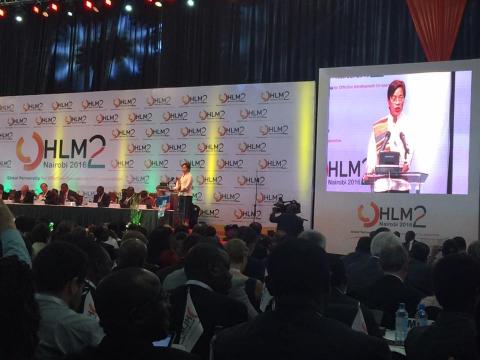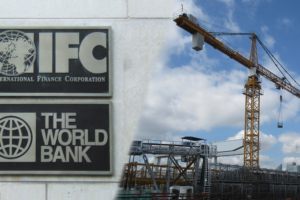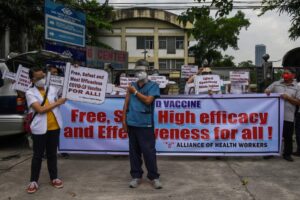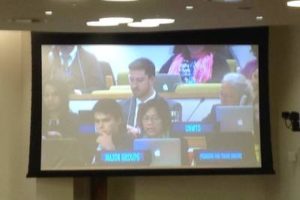IBON International Statement
Second High-Level Meeting
Global Partnership for Effective Development Cooperation
Nairobi, Kenya, 30 November 2016
[[{“type”:”media”,”view_mode”:”media_large”,”fid”:”1603″,”attributes”:{“alt”:””,”class”:”media-image”,”height”:”360″,”style”:”width: 350px; height: 263px; margin: 5px; float: right;”,”typeof”:”foaf:Image”,”width”:”480″}}]]
The Busan Partnership asserts ‘investments and efforts must have a lasting effect on eradicating poverty and reducing inequality, on sustainable development, and on enhancing developing countries’ capacities, aligned with the priorities and policies set out by developing countries themselves’.[i]
However, many of the ideas that circulate throughout the development cooperation deliberations represent obstacles to this. The most significant is the idea that ‘the core characteristics of the business sector – including the profit motive – can and do create mutual benefit by contributing to the public good’.[ii] Protests by those displaced, impoverished or left behind by privatization contest this.
The protests point to the danger of public-private partnerships (PPPs) in development financing. While promoted by the World Bank Group and USAID, among others, there is little evidence of their development effectiveness.[iii] This is beside the risk of corruption and other negative impacts.[iv]
In an example[v] from the Northeast Indian state of Manipur, the Chadong people have protested their imminent displacement from their own land by the construction, via PPP, of the Mapithel Dam. The protesters were brutally beaten and tortured by the Indian Reserve Battalion and Manipur Police.[vi]
The emphasis on the business sector role in development, and the insufficient recognition of such problems, threaten the ‘leave no one behind’ mission. The risk of losing focus is apparent from the share of private sector development activities managed by development finance institutions, whose mandates conflict with a development focus, and which primarily promote donor interests.[vii]
This points to the need either to cease channelling development funds through DFIs, or else to restructure them to include the participation of stakeholders including workers representatives (especially given the tendency of privatization to result in workforce reductions) and representatives of marginalized populations. There is a need for more democratic ownership over development efforts.
Under democratic ownership private sector contributions to development may be maximised: each country must arrive at a common understanding about the history and specificities of its domestic private sector, and on that basis, forge a democratic consensus on programs to develop domestic entrepreneurship and cooperatives with strong linkages to local agriculture, industry and services.[viii]
Democratic ownership is all the more important as profiteering is frequently supported by militarization, as suggested by the actions of the Indian Reserve Battalion and Manipur police. These actions are echoed globally, prominently as of late in the repression of the courageous Council of Popular and Indigenous Organizations of Honduras (COPINH) and the murder of activist Berta Cáceres.
This military repression in Honduras came as the state eagerly embraced a neoliberal development model, under the slogan ‘Honduras is open for business’, and sought to attract foreign investors and finance institutions such as the World Bank—IFC for infrastructure development.
The development effectiveness agenda must confront both profiteering and militarization especially since by 2030 poverty will be concentrated in fragile states and sub-Saharan Africa.[ix]
The Busan Partnership represents a commitment to ‘deepen, extend and operationalise democratic ownership of development policies and process’[x] and for governments and donors to provide an enabling environment for CSO promotion of human rights to help advance this aim.[xi]
During the Second High-Level Meeting of the GPEDC, it must be remembered that mutual benefit is a function of democratic ownership. The profit motive by contrast yields one-sided benefits for the few. Put simply, democratic ownership means putting people over profit.
IBON International (www.iboninternational.org) engages in capacity development for people’s rights and democracy around the world. It strengthens links between local campaigns and advocacies to international initiatives and brings development issues from the international arena in a way that peoples’
[i] OECD (2011), §11(b). Busan Partnership for Effective Development Co-operation, Paris: OECD.
[ii] GPEDC (2016), Third Draft of the Nairobi Outcome Document, Annex 1, §8.
[iii] Jomo KS, Anis Chowdhury, Krishnan Sharma, and Daniel Platz (2016), ‘Public-Private Partnerships and the 2030 Agenda for Sustainable Development: Fit for Purpose?’, DESA Working Paper No. 148, NY: UN.
[iv] Maria José Romero (2015), What Lies Beneath?: A Critical Assessment of PPPs and their Impact on Sustainable Development, Brussels: Eurodad.
[v] For other examples, see Mercado (2016), Special Release: A Primer on PPPs in Food and Agriculture, Quezon City: People’s Coalition on Food Sovereignty.
[vi] Pushpa Koijam, Mamta Lukram and Jiten Yumnam (2016), Assessment of ODA and the Implications on Indigenous People in Manipur, Brussels: TUDCN.
[vii] CPDE-TUDCN (2015), Business Accountability for Development, Brussels: TUDCN.
[viii] See IBON International (2014), IBON Primer on The Private Sector in Development: Privatization of Development Cooperation?, Quezon City: IBON International.
[ix] Homi Kharas and Andrew Rogerson (2012). Horizon 2025: Creative Destruction in the Aid Industry, London: Overseas Development Institute.
[x] OECD (2011), ibid., §12.
[xi] Ibid., §22(a).




